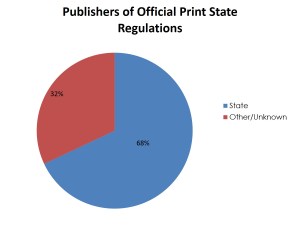It’s very common for states to rely on private publishing companies to publish their state law. This practice creates a barrier to access in two ways. First, as these publishers are a for-profit business, it is presumed that the cost of accessing the law is higher than it would be to purchase the law from a state publisher. Secondly, corporations often wrap the public domain law with copyrightable material, making it hard to extract the “free law” from a publication. Finally, the commercial publishers are much more likely to enact restrictive terms of use preventing the redistribution of the law.
For an example of this, see this excerpt from a Thomson Reuters (West) case reporter. Click to enlarge.
However, it should be noted that this practice isn’t entirely without benefits to accessing law. Commercial publishers are much more likely to publish law in a timely manner. Additionally, especially with web based publication, publish the law in such a way that is more user friendly, especially to a non-expert researcher.
For corporate control issues, this study looked at both the web and print publications of legal information. For online publications, the state was by far the most common publisher. When it comes to print publications, it was more likely the state would outsource the publication of law to a corporation for case law and statutory codes. Regulations, however, were mostly done by the state.
For case law online publication, the state was the publisher of law in ninety-seven (97) out of one hundred and five (105) websites surveyed. For the ninety-seven official print versions of case law, the state was the publisher in twenty-three (23) instances. The Thomson Reuters (West) corporation was by far the major publisher when it comes to case law.

 With regards to codes, once again the state was the primary publisher of online versions of code. In forty-two (42) out of (51) instances, the state was the publisher of the online version.
With regards to codes, once again the state was the primary publisher of online versions of code. In forty-two (42) out of (51) instances, the state was the publisher of the online version.
 In regulations, the state is the predominant publisher for both online and official print versions. For online regulations, the state was the publisher in forty-five (45) out of fifty (50) websites visited. For the print versions, the state was the publisher in thirty-four (34) out of fifty (50) states.
In regulations, the state is the predominant publisher for both online and official print versions. For online regulations, the state was the publisher in forty-five (45) out of fifty (50) websites visited. For the print versions, the state was the publisher in thirty-four (34) out of fifty (50) states.



